Lessons in Grace: A Map’s Edge Newsletter Feature
Posted on
05/06/17
Author
Owen Yager, Student Alumnus
Most mornings in Sampela, Totombo, my host father, and I were awoken by boardwalk roosters crowing in the sun and would be on the water not much later.
We went out in his boat, a battered blue canoe that was roomier and required less bailing than most other boats in Sampela—a financial testament to his fishing capability—and were armed with a long speargun for him, a short, easy to reload speargun for me, and one extra for good measure. We would cruise across a sea peppered by waves big enough to make the boat rock a little until he, peering over the side of the boat, decided that he liked the fishing prospects of that particular spot of ocean. He’d flash me a terrific smile, say, “Ini bagus” (“This is good”), and launch overboard. I’d follow him, much less gracefully, and hope that I was in the water in time to watch him tie the anchor onto whatever monolithic coral structure we’d have stopped over.
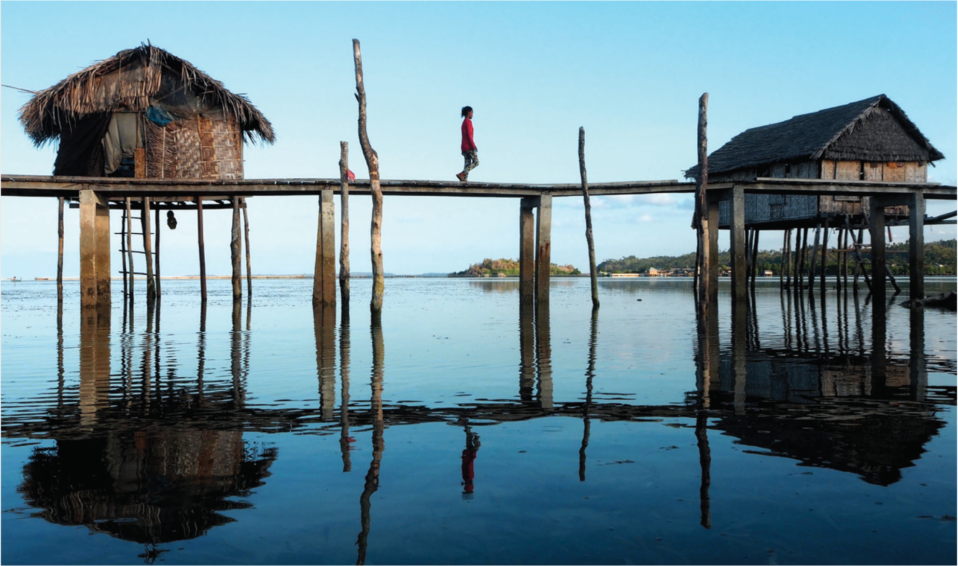
Photo by CELIA MITCHELL, INDONESIA SEMESTER
Then we’d stretch the cut lengths of rubber on our wooden spearguns back, lock in the spears, and dive down. Totombo always caught the first fish, spinning up to the surface with a joyous smile before dropping his catch in the katingting and diving back down. Sometimes my only role for a morning would be to swim his catch back to the boat, and it took me a few days before I caught my first batfish, his most commonly sought prey. Those mornings were always lovely. It was just the two of us in a small blue boat in the middle of the ocean, swimming and fishing and basking in the Indonesian sun, and it was blissful.
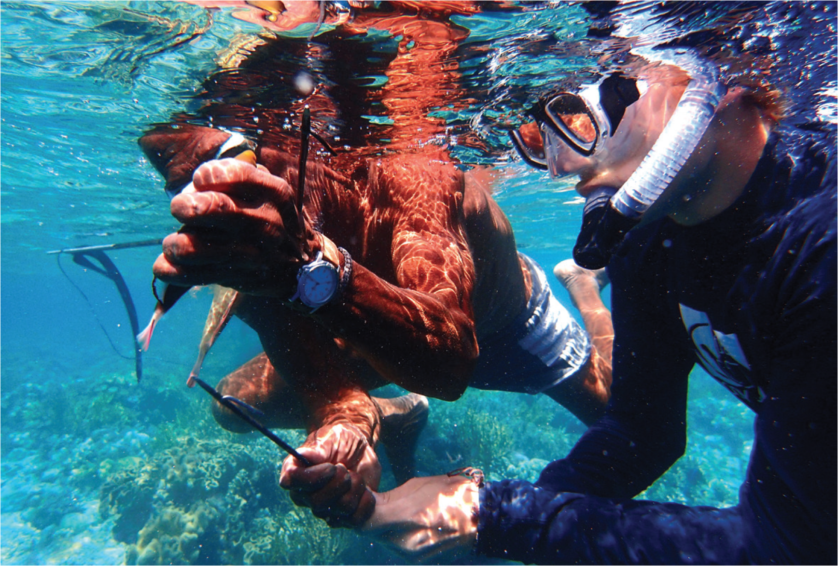
Photo by CELIA MITCHELL, INDONESIA SEMESTER
About halfway through my time in Sampela, we started to go out earlier and travel farther, fishing for upwards of six hours. On one of these days, we were taking a break in what was starting to be a blisteringly hot day when a few boats puttered up to us and cut their engines. I’m not quite sure what was said over the next 45 minutes, given that they were speaking in Bajo, but somehow Totombo and I ended up a part of Mr. Helmet and Mrs. Hat’s crew.
I took to calling them Mr. Helmet and Mrs. Hat as a way of referring to them in conversation with other Dragons, and their monikers descended from their headpieces. Mrs. Hat always wore a huge bamboo hat. It’s shadow rarely let the warm glow of her eyes out, instead showing only her sun-leathered face and betel-stained teeth. Mr. Helmet had a well-worn black construction hat which kept the sun off his face and, more importantly, kept his cigarettes and lighter dry from the ocean’s spray and Sampela’s monsoon rains—it only occasionally showed his face when we were there during the dry spread along the ropes scared most of the fish in their way towards the net and the net was soon teeming with a swirl of fish. I was told in no uncertain terms by Totombo to stay out of the net but I was permitted to get in the water and watch from a distance.
They had one of the only nets I saw in Sampela, and certainly the largest. It had it’s own canoe, and Totombo and I (mostly Totombo) were recruited to help use it. Mr. Helmet and Mrs. Hat each had a large boat filled with several hundred feet of rope with some floating thing— a plastic bag, a water jug, a stick—tied every couple yards. Leaving the net, the net’s canoe, myself and my canoe anchored, each boat began to go in an opposite direction, slowly paying out the rope as they went. The old man who had ridden in the canoe with the net was spending this time pulling the net out and setting it up in the sea and I, unskilled and unable to help, watched like the five year-olds that sometimes accompanied their mothers and fathers to the ocean.
The rope-boats eventually finished unloading their ropes and began to arc around, back towards us. The miscellaneous debris spread along the ropes scared most of the fish in their way towards the net and the net was soon teeming with a swirl of fish. I was told in no uncertain terms by Totombo to stay out of the net but I was permitted to get in the water and watch from a distance.
The net, I realized once I’d gotten in the water, didn’t have a bottom. It was weighed down at the edges, so fish couldn’t get out, but to lift it out of the water like a trawling net reduced its size tremendously, so the Bajo would simply use it as a pen for fish instead. I spent a few moments ogling at the swirl of fish in the nets, filled with lashes of green from parrotfish and red from snapper, before a set of splashes indicated the arrival of the. The swirl turned into a frenzy, punctured by the familiar swish of a speargun’s projectile whipping through the water. By the time I got out of the water our boat was carpeted with fish.
Once the spear-gunners had sufficiently thinned the school in the net, it was closed from the bottom and Mr. Helmet and a fisherman who had helped set up the net pulled it in hand over hand. It wasn’t until it had been landed that I realized that the catch from the net far exceeded any individual’s spearfishing catch, and that Mr. Helmet and Mrs. Hat allowing their helpers to spearfish the net was as much a method of payment as it was necessary to land the net.
The fishermen, triumphant for the day, spent a few moments enjoying their success and the sun before Mr. Helmet called us over to his boat. He gave us a few armfuls of miscellaneous fish and handed Totombo a massive wrasse, his further thanks for Totombo’s help.
Over the rest of my stay in Sampela, Totombo and I rendezvoused with Mr. Helmet and Mrs. Hat three more times. Each time we fished a different part of the ocean and each time our catch was better than when we fished on our own. On my last day in Sampela, Mr. Helmet was on our porch when I woke up and we rode out to the reef with him as part of a flotilla of boats that carved its way to a white sanded reef that was farther from Sampela than I’d been since I arrived. I’d been taught enough by Totombo—about how to read a gesture towards a fish, about how to tie anchors to the ocean floor, about how to be safe with a speargun—over the past two weeks that I was allowed to participate now. Together on that last day, he and I swam over the sun- dappled seabed as host and guest, master and pupil, father and son.
(This article was featured in the Spring 2017 edition of Dragons bi-annual Newsletter, The Map’s Edge. Each newsletter explores a subject of interest to the Dragons community through the voices of our Alumni, Instructors, Partners, Parents and our International Staff and contacts. Feel free to view our archive of editions of The Map’s Edge or even submit a piece to be featured in our next issue by sending an email to [email protected])
OWEN YAGER is a Dragons alum who spent his gap year working as a farm-hand on a ranch in Idaho and attending Dragons Indonesia semester program. He is a Freshman at Carleton College.

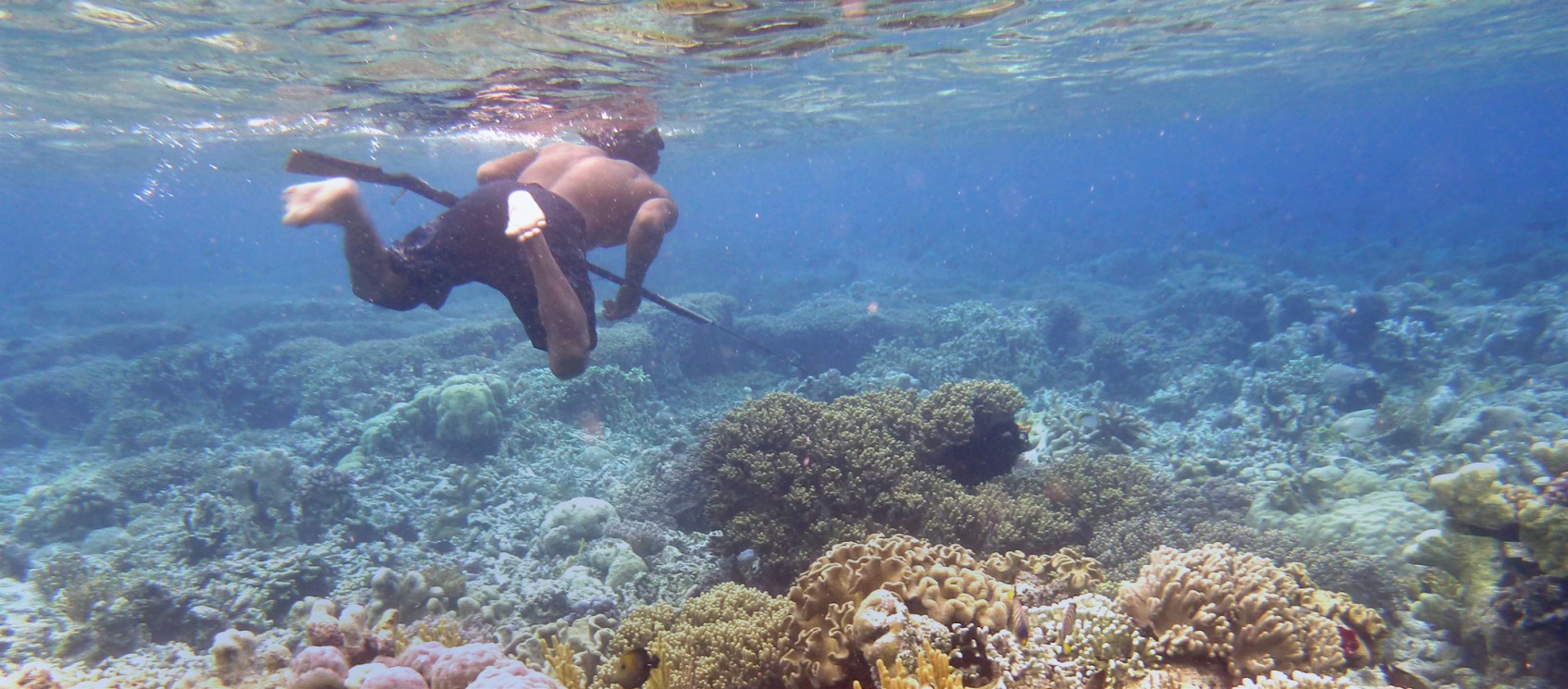
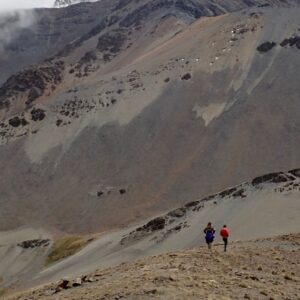
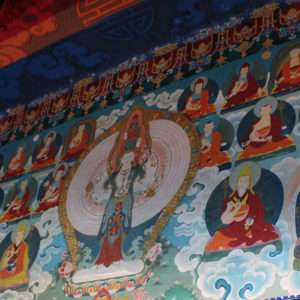
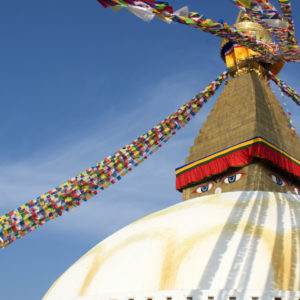
Leave a Comment